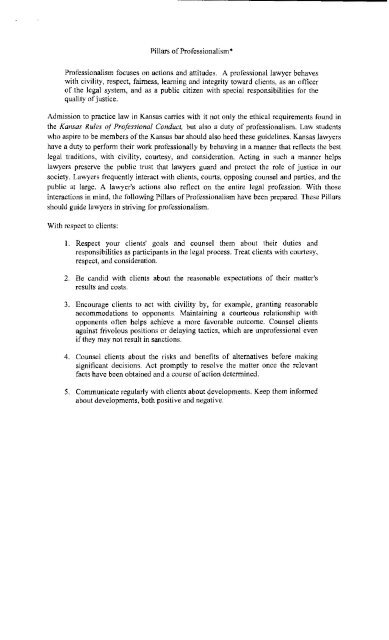2012 SC 82 - Kansas Judicial Branch
2012 SC 82 - Kansas Judicial Branch
2012 SC 82 - Kansas Judicial Branch
Create successful ePaper yourself
Turn your PDF publications into a flip-book with our unique Google optimized e-Paper software.
Pillars of Professionalism*<br />
Professionalism focuses on actions and attitudes. A professional lawyer behaves<br />
with civility, respect, fairness, learning and integrity toward clients, as an officer<br />
of the legal system, and as a public citizen with special responsibilities for the<br />
quality of justice.<br />
Admission to practice law in <strong>Kansas</strong> carries with it not only the ethical requirements found in<br />
the <strong>Kansas</strong> Rules of Professional Conduct, but also a duty of professionalism. Law students<br />
who aspire to be members ofthe <strong>Kansas</strong> bar should also heed these guidelines. <strong>Kansas</strong> lawyers<br />
have a duty to perform their work professionally by behaving in a manner that reflects the best<br />
legal traditions, with civility, courtesy, and consideration. Acting in such a manner helps<br />
lawyers preserve the public trust that lawyers guard and protect the role of justice in our<br />
society. Lawyers frequently interact with clients, courts, opposing counsel and parties, and the<br />
public at large. A lawyer's actions also reflect on the entire legal profession. With those<br />
interactions in mind, the following Pillars of Professionalism have been prepared. These Pillars<br />
should guide lawyers in striving for professionalism.<br />
With respect to clients:<br />
I. Respect your clients' goals and counsel them about their duties and<br />
responsibilities as participants in the legal process. Treat clients with courtesy,<br />
respect, and consideration.<br />
2. Be candid with clients about the reasonable expectations of their matter's<br />
results and costs.<br />
3. Encourage clients to act with civility by, for example, granting reasonable<br />
accommodations to opponents. Maintaining a courteous relationship with<br />
opponents often helps achieve a more favorable outcome. Counsel clients<br />
against frivolous positions or delaying tactics, which are unprofessional even<br />
if they may not result in sanctions.<br />
4. Counsel clients about the risks and benefits of alternatives before making<br />
significant decisions. Act promptly to resolve the matter once the relevant<br />
facts have been obtained and a course of action determined.<br />
5. Communicate regularly with clients about developments. Keep them informed<br />
about developments, both positive and negative.
















